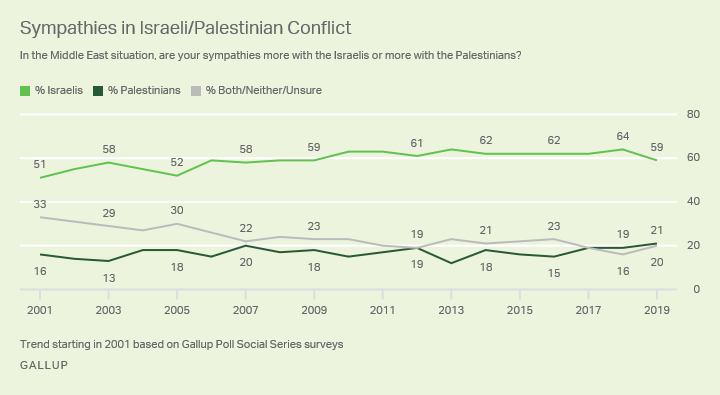Ruthie Blum: Nothing new in Ramallah
Abbas clearly intends to adhere to this fatwa, as he made clear during a trip to Egypt in January.Honest Reporting: Debunking the ‘Disproportionate Force’ Charge
"I will not end my life as a traitor," he told reporters in Cairo. "I can say 'no,' and I have a people that can say 'no' beside me. … The doors are closed to the U.S. As long as it does not retract its decisions against the Palestinian people, no Palestinian should meet with the American leadership, no matter what their role is."
More recently, on a visit to Iraq on Monday, Abbas told leaders in Baghdad that the Trump administration "is encouraging Israel to be a state above the law," as well as "biased and not suitable to be a sponsor of peace talks."
So much for the "deal of the century," whose details have yet to be revealed. So much for the fantasists in Israel and abroad who continue to harbor any hope.
It’s unequivocal that greater numbers of Palestinians than Israelis have been killed or injured during periods of intense conflict. This has repeatedly led to accusations that Israel has employed “disproportionate force” for security measures and during military operations over the years.Critics of America's Support for Israel Cannot Escape History
The term has has been abused by activists, journalists, non-governmental organizations and politicians who have employed it without bothering to research precisely what disproportionate actually means in terms of international law. One thing it does not mean an imbalance in casualty figures proves Israeli disproportionate force.
So what does it mean? Here are some explanations.
Operation Cast Lead
The UN’s Goldstone Report into the 2008-09 Operation Cast Lead, later recanted by its author Judge Richard Goldstone, asserted that Israel had launched a “deliberately disproportionate attack designed to punish, humiliate and terrorize a civilian population, radically diminish its local economic capacity both to work and to provide for itself, and to force upon it an ever increasing sense of dependency and vulnerability.”
Back in 2011, former commander of UK forces in Afghanistan, Colonel Richard Kemp stated in response:
no one has been able to tell me which other army in history has ever done more to safeguard the rights of civilians in a combat zone.
In fact, my judgments about the steps taken in that conflict by the IDF to avoid civilian deaths are inadvertently borne out by a study published by the United Nations itself, a study which shows that the ratio of civilian to combatant deaths in Gaza was by far the lowest in any asymmetric conflict in the history of warfare.
The UN estimate that there has been an average three-to one ratio of civilian to combatant deaths in such conflicts worldwide. Three civilians for every combatant killed.
That is the estimated ratio in Afghanistan: three to one.
In Iraq, and in Kosovo, it was worse: the ratio is believed to be four-to-one. Anecdotal evidence suggests the ratios were very much higher in Chechnya and Serbia.
In Gaza, it was less than one-to-one.
Certain of our recently elected congressional representatives view U.S. support for Israel as inexplicable. They are dismissive of explanations of shared values or strategic importance. They ask what reason other than a malignant influence could possibly explain why the U.S. has supported Israel and Zionism.Gallup: Americans still overwhelmingly support Israel, antisemitic conspiracy mongers hardest hit
They fail to appreciate the extent to which the restoration of the Jewish people to sovereignty in their ancient homeland has been deeply ingrained in the religious, political and social fabric of America.
Even before there was a U.S., our Founding Fathers and even their forefathers longed to restore the Jews to their ancient homeland. The Puritans saw themselves as a "New Israel." Increase Mather, the Puritan leader, taught his followers that one day the "Jews would return to their homeland and establish the most glorious nation in the world." The Yale University coat of arms is adorned with the Hebrew words meaning "light and perfection."
Benjamin Franklin recommended that the Great Seal of the United States be an illustration of the Hebrews fleeing Egypt for their homeland. John Adams wrote in 1819: "I really wish the Jews again in Judea an independent nation." This all occurred when the Jews in America numbered only in the thousands.
Abraham Lincoln wrote of "restoring the [Jews] to their national home in Palestine" and that relieving their oppression was "a noble dream and one shared by many Americans." This support was echoed by Teddy Roosevelt, Woodrow Wilson and Herbert Hoover.
While recent congressional critics of America's support of Israel might dismiss this history, they cannot escape it.
The Democrat Party is trying to come to grips with the antisemitic agitation by Minnesota Rep. Ihlan Omar, backed by Reps. Rashida Tlaib and Alexandria Ocasio-Cortez, that Americans who support Israel do so for money and have pledged allegiance to Israel.
These dual-loyalty and disloyalty accusations are echoed by left-wing and Islamist Democrat activists.
We have made the point in the past that support for Israel was at historical highs, as measured by Gallup. When Gallup released its results in March 2018, Gallup: Americans’ support for Israel increases to historical high:
These findings reinforce a point I’ve made many times. The so-called “Israel Lobby” is the American people.
Gallup just released its 2019 report, and finds that support for Israel over the Palestinians has dropped slightly, returning to the level in 2009. This drop was largely due to a drop in support among Republicans, which is hard to understand. So we’ll have to see if this is a blip, or a long-term trend. As other polling has showed, the weakest support for Israel comes from liberal Democrats.
Gallup reports, Americans, but Not Liberal Democrats, Mostly Pro-Israel:
The majority of Americans remain partial toward Israel in the Israeli-Palestinian conflict, with 59% saying they sympathize more with the Israelis whereas 21% sympathize more with the Palestinians. While still widespread, sympathy toward Israel is down from 64% in 2018 and marks the lowest percentage favoring Israel since 2009. Meanwhile, the 21% sympathizing more with the Palestinians, statistically unchanged from a year ago, is the highest by one point in Gallup’s trend since 2001.
These results are based on Gallup’s annual World Affairs survey, conducted each February. The 2019 poll was conducted Feb. 1-10 prior to Minnesota Rep. Ilhan Omar’s recent remarks questioning U.S. support for Israel and suggesting that some supporters of Israel are pushing for “allegiance to a foreign country.” ….










































